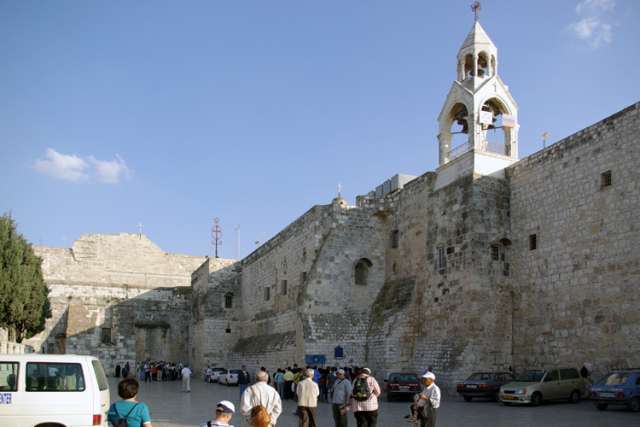A religion which proclaims sight for the blind and freedom for the oppressed can hardly take the view that Christ's mercy is only for some people some of the time.
But the term status quo actually originates at the Church of the Nativity in Bethlehem. The status quo is the agreement between Catholics, the Orthodox, the Armenians, the Copts and the Ethiopian Tawehedo Orthodox that allows Christians to share the birthplace of Jesus in peace.
This morning I experienced the status quo — Mass in the grotto, one level down in the church, where tradition claims Jesus was born. Five Bridgettine Sisters and I arrived at the church about 8:30 a.m., when the tourist crowds are pretty thin, in time to watch Russian Orthodox pilgrims emerge from the grotto — women in babushkas with holy oil on their hands and tears in their eyes accompanied by a few black-robed, bearded priests.
We waited our turn. The Franciscans moved in with quiet efficiency, bringing in a painting, some cushions to soften the stone bench for the priests, an electric keyboard that does a good enough job of mimicking a pipe organ. The sisters and I came down the steps and into the lamplit cave as the Franciscans were setting out folding chairs for between 30 and 40.
There can be no lingering in the set-up for Thursday Mass because the Armenians have their scheduled time and the status quo means there can be no encroachment on their slot.
The Novus Ordo Mass was chanted in Latin. The Gospel was the opening passage of the Gospel of John, the reading for Christmas Day that declares "In the beginning was the Word." There was no homily, only a brief moment of silence among pilgrims and religious who speak Italian, Spanish, Tagolog, English. Then right to the eucharistic prayers sung at an altar just out of sight, in a nook not much bigger than a phone booth, two steps down from the main part of the grotto.
By this time a few more pilgrims had drifted down then sat on the steps to respectfully watch a liturgy they likely didn't know was happening before they arrived. By the time we received communion one of the religious tourists on the steps is hiding and drying her tear-stained face with her hands as a friend is passing her tissues.
As the Mass ends, again there's no lingering. The Armenians are at the top of the stairs waiting their turn. The crying woman must move to make a path for the three concelebrating priests to process out. Hymn books and missals are collected, chairs folded and stacked back in the little closet.
The status quo agreements among the churches were first negotiated and enforced under the Ottomans in 1852. British military men found themselves enforcing them after the First World War. The Jordanian royal family carried on for a while. After the 1967 war the Israelis were watching over the status quo.
Today Mahmoud Abbas and the Palestinian Authority are in charge.
You might think the churches could govern themselves, but as recently as 2011 several Orthodox priests wound up swinging booms and fists over accusations that one or other of them had violated the status quo.
We live in a fallen world and the mysteries and traditions of the Church have been entrusted to sinful human beings. Even priests can lose their temper and fight like school boys. But when the status quo works there is a little space for each of us to praise God with whatever beauty, honesty and love we have at hand. It would be less beautiful without the Armenians, without the Russians or without the Franciscans.
When Pope Francis arrives to celebrate a Mass just 400 metres from the Grotto in Manger Square, he will not be fighting for the status quo. The Pope's ideal is not an 1852 treaty negotiated under the authority of the sultan in Damascus. His goal must be to bring all Christians together at this ground zero of God's explosion into the world. He doesn't want any Church giving up a single moment of its time in the grotto to praise God with the beauty of their own music, language, art, hope, service, love.


